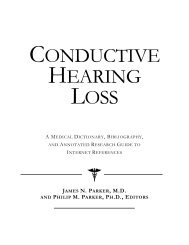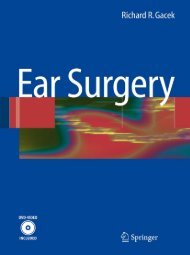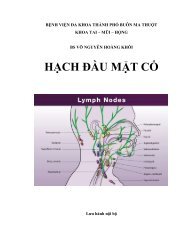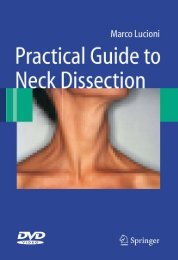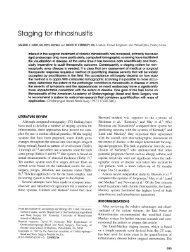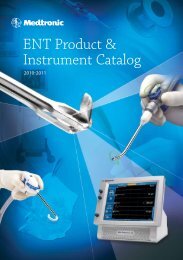Familial Nasopharyngeal Carcinoma 6
Familial Nasopharyngeal Carcinoma 6
Familial Nasopharyngeal Carcinoma 6
- No tags were found...
Create successful ePaper yourself
Turn your PDF publications into a flip-book with our unique Google optimized e-Paper software.
32 Q-T. Le and J. J. LuInterestingly, the above-illustrated relationshipbetween EGFR and prognoses of NPC was not demonstratedin pediatric patients. In a small series of 20juvenile NPC patients of < 20 years old, overexpressionof EGFR was observed in 65% of the cases.However, no significant relationship was identifiedbetween EGFR overexpression and disease stage,overall survival, and disease-free survival (Fanget al. 2007). The underlying reason for this discrepancybetween pediatric and adult NPC patients is notclear. However, considering the small sample size, thevariability in treatment strategy for the differentpatients (~50% received radiation alone whereasthe remainder received combined chemoradiationtherapy), and potential intrinsic differences in thebiology of adult and pediatric tumors, further investigationsare needed to address the effect of EGFR inpediatric NPC patients.3.2.5Targeting EGFR for <strong>Nasopharyngeal</strong>Cancer TreatmentThe association between overexpression of EGFRand poor prognoses after definitive radiation therapy,the potential activation of EGFR signaling pathwayby radiation, the availability of EGFR targetingdrugs, and prior successes in targeting this pathwayin other SCCHN together make EGFR targeting anideal treatment strategy in NPC management. Severalstrategies have been used to target EGFR clinically.The two relatively mature approaches include (1) theuse of monoclonal antibodies (MAbs) against theextracellular domain to block ligand binding andsignal transduction such as cetuximab and panatunumaband (2) the use of tyrosine kinase inhibitors(TKI) to compete and prevent ATP-bindingintracellularly, thereby inhibiting tyrosine autophosphorylationan downstream intracellular signaling.Although the effect of anti-EGFR MAbs and TKIon tumor cell cytotoxicity, angiogenesis, invasion,and metastasis are well studied in several solid tumorsincluding nonsmall cell lung cancer, colorectal cancer,and SCCHN (Vokes and Chu 2006), little isknown about the effect of these drugs in NPC preclinicallyor clinically. Only one study showed thatCetuximab has single agent activity in certain NPCcell lines and has additive cytotoxic effect with cisplatinand paclitaxel in vitro (Sung et al. 2005). Nostudy has evaluated the effect of this drug in combinationwith radiation in NPC and there is no publishedreport on the effect of TKIs on NPC cells eitherin vitro or in vivo setting.Nevertheless, clinical trials have started to employthese drugs, specifically cetuximab and gefitinib, incombination with chemotherapy in patients withrecurrent/metastatic NPC. In a multi institutional singlearm phase II trial, cetuximab in combination withcarboplatin was demonstrated to yield a response rateof 11.7% and a disease stabilization rate of 48%, whichis promising in a group of heavily pretreated patients(Chan et al. 2005). However, gefitinib, an anti-EGFRTKI, provided no significant efficacy with no observedresponse in a similar setting according to two otherphase II trials (Ma et al. 2008a, Chua et al. 2008).The utilization of either anti-EGFR MAbs or TKIconcurrently with radiation therapy in the definitivetreatment of NPC has not been fully addressed.A recently published abstract from Hong Kong onan ongoing phase II trial indicated that neoadjuvantcetuximab followed by concurrent cetuximab–cisplatin and intensity-modulated radiotherapy (IMRT)yielded an 83% complete response and a 17% partialresponse rate at 3 months post-radiation therapy(Ma et al. 2008b). However, long-term outcomes fromthis treatment strategy are not available.A thorough discussion of the clinical utilization ofanti-EGFR agents as well as their associated treatmentoutcome in NPC is out of the scope of thischapter, and is detailed in Chap. 11.3.3Angiogenesis and <strong>Nasopharyngeal</strong><strong>Carcinoma</strong>3.3.1AngiogenesisAngiogenesis is the process of the development andformation of new blood vessels from an existing vascularnetwork to support tissue growth. It is animportant physiological phenomenon in the embryonicphase of human development. However, it isnormally suppressed in adulthood and is a rare physiologicalevent (Folkman 1995a; Risau 1997).The process of angiogenesis involves degradationof basement membranes, migration and proliferationof endothelial cells, lumen formation, and stabilizationof neovasculatures, which are crucial for thedevelopment, invasion, and metastasis of tumor. Ithas been demonstrated that without neovasculatures,transportation of oxygen and nutrients are largely via





